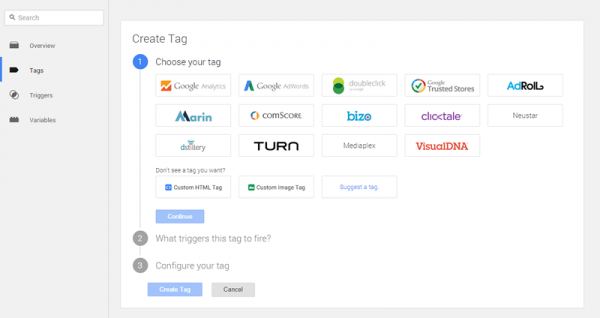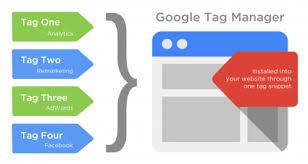
B2B Articles - August 15, 2015
Seeing as the marketing world is a buzz with talk of Google Tag Manager, or GTM, we’ve created the following resource to summarize what GTM Is, why it’s important, and the eight key benefits it offers to your organization.

Google Tag Manager is a free tool that eliminates tedious code-editing tasks that formerly required a developer. It allows the marketing team to add and update their own website tags – including javascript code snippets for site analytics, conversion tracking, and remarketing – while the development team focuses on larger projects.

 Tags are snippets of website code that measure traffic and visitor behavior. In addition to offering insight into the impact of online advertising and social changes, tags make it easy to target your audience, leverage remarketing, and test and improve your site. These tags also enable specific site functions. For example, through the use of the Google Analytics tag.
Tags are snippets of website code that measure traffic and visitor behavior. In addition to offering insight into the impact of online advertising and social changes, tags make it easy to target your audience, leverage remarketing, and test and improve your site. These tags also enable specific site functions. For example, through the use of the Google Analytics tag.
Tagging is complex. Large websites in particular need to constantly update their tags, add new tags, and execute complicated installations. If this isn’t all managed properly, the tags can slow down your site, misrepresent your measurements, and lead to duplicate costs and missing data. In addition, it’s time-consuming to manage tags without a system, and doing so can delay important marketing and measurement programs.

Now that you know what Google Tag Manager is and why it’s important, here are the 8 key benefits it offers:
1. Ease of use. GTM enables team members to make updates and add new tags quickly and easily, without complex code changes to the site. This allows the team to test each change and deploy when ready without the help of a developer, which streamlines the process, speeds time to launch, and allows the IT department to focus on larger projects like improving the site as a whole.
2. Easy updates and a future-proofed website. GTM makes future upgrades and enhancements much simpler, since modifications can be made through the interface and not on each page of your website. In addition, if you’re considering upgrading to Universal Analytics, GTM’s upgrades will make the gradual transition much easier.
3. Debug features. GTM’s built-in debug features allow the team to test and debug each update on your site prior to publication, ensuring that your tags work properly before they are live.
4. Version control. A new, archived version is created every time you publish a change through GTM, making it easy to rollback to a former version at any moment. This is ideal because it keeps tags organized; makes troubleshooting simple; and allows you to easily implement similar installations on new GTM containers.
5. Users and permissions management. GTM makes it easy to set permissions for individual users and control internally who has the ability to make changes to the website and assist with creating tags, macros, and rules.
6. Built-in tags. GTM comes with a number of important built-in tags for classic and Universal Analytics, AdWords conversions, remarketing, and more. This allows a marketing team that lacks coding experience to customize tags with just a few pieces of key information, without implementing complicated code or enlisting the help of a developer.
7. Functions with Google Analytics. Speaking of built-in tags, GTM also allows you to install a basic implementation of Google Analytics via Google Tag Manager. GTM includes a tag template that gives you all the options you would have had in your previous Google Analytics implementation. Plus, it’s compatible with older onsite code for event tracking, page views, and cross domain tracking.
8. Event tracking. Traditionally, event tracking involved adding code to the website to track visitor events like clicks, video engagement, and form submissions. GTM’s auto-event tracking feature eliminates the need to manually tag each link you want to track. Instead, you can target links or buttons by attributes that are already on the link or by using a standardized naming structure.

Tel 212-993-7809
Ironpaper ®
10 East 33rd Street
6th Floor
New York, NY 10016
Map
New York Agency
B2B marketing
B2B Content
Demand generation agency
Digital Marketing
Account-Based Marketing
ABM for SaaS
ABM for energy
Demand generation campaigns
Industry marketing
Privacy Policy
First-party data marketing
SaaS marketing
SEO for B2B
IoT Marketing
B2B Marketing for IoT Companies
HubSpot Agency
B2B Product Marketing
B2B Software Marketing
IoT go-to-market strategy
IT Marketing
HubSpot for ABM
ABM for AI companies
Technology Marketing
Marketing for IT Companies
ABM Campaigns
B2B lead generation
B2B Marketing and Growth Agency.
Grow your B2B business boldly. Ironpaper is a B2B marketing agency. We build growth engines for marketing and sales success. We drive demand generation campaigns, ABM programs, B2B content, sales enablement, qualified leads, and B2B marketing efforts.